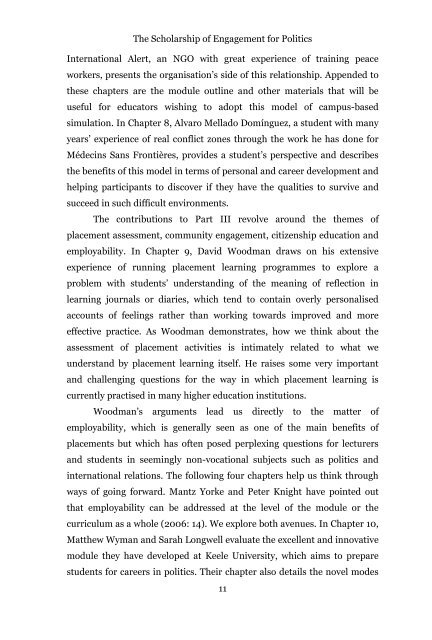The Scholarship of Engagement for Politics: - Higher Education ...
The Scholarship of Engagement for Politics: - Higher Education ...
The Scholarship of Engagement for Politics: - Higher Education ...
You also want an ePaper? Increase the reach of your titles
YUMPU automatically turns print PDFs into web optimized ePapers that Google loves.
<strong>The</strong> <strong>Scholarship</strong> <strong>of</strong> <strong>Engagement</strong> <strong>for</strong> <strong>Politics</strong><br />
International Alert, an NGO with great experience <strong>of</strong> training peace<br />
workers, presents the organisation’s side <strong>of</strong> this relationship. Appended to<br />
these chapters are the module outline and other materials that will be<br />
useful <strong>for</strong> educators wishing to adopt this model <strong>of</strong> campus-based<br />
simulation. In Chapter 8, Alvaro Mellado Domínguez, a student with many<br />
years’ experience <strong>of</strong> real conflict zones through the work he has done <strong>for</strong><br />
Médecins Sans Frontières, provides a student’s perspective and describes<br />
the benefits <strong>of</strong> this model in terms <strong>of</strong> personal and career development and<br />
helping participants to discover if they have the qualities to survive and<br />
succeed in such difficult environments.<br />
<strong>The</strong> contributions to Part III revolve around the themes <strong>of</strong><br />
placement assessment, community engagement, citizenship education and<br />
employability. In Chapter 9, David Woodman draws on his extensive<br />
experience <strong>of</strong> running placement learning programmes to explore a<br />
problem with students’ understanding <strong>of</strong> the meaning <strong>of</strong> reflection in<br />
learning journals or diaries, which tend to contain overly personalised<br />
accounts <strong>of</strong> feelings rather than working towards improved and more<br />
effective practice. As Woodman demonstrates, how we think about the<br />
assessment <strong>of</strong> placement activities is intimately related to what we<br />
understand by placement learning itself. He raises some very important<br />
and challenging questions <strong>for</strong> the way in which placement learning is<br />
currently practised in many higher education institutions.<br />
Woodman’s arguments lead us directly to the matter <strong>of</strong><br />
employability, which is generally seen as one <strong>of</strong> the main benefits <strong>of</strong><br />
placements but which has <strong>of</strong>ten posed perplexing questions <strong>for</strong> lecturers<br />
and students in seemingly non-vocational subjects such as politics and<br />
international relations. <strong>The</strong> following four chapters help us think through<br />
ways <strong>of</strong> going <strong>for</strong>ward. Mantz Yorke and Peter Knight have pointed out<br />
that employability can be addressed at the level <strong>of</strong> the module or the<br />
curriculum as a whole (2006: 14). We explore both avenues. In Chapter 10,<br />
Matthew Wyman and Sarah Longwell evaluate the excellent and innovative<br />
module they have developed at Keele University, which aims to prepare<br />
students <strong>for</strong> careers in politics. <strong>The</strong>ir chapter also details the novel modes<br />
11
















